法律英语学习:中国的侦查制度
- 格式:doc
- 大小:18.00 KB
- 文档页数:5

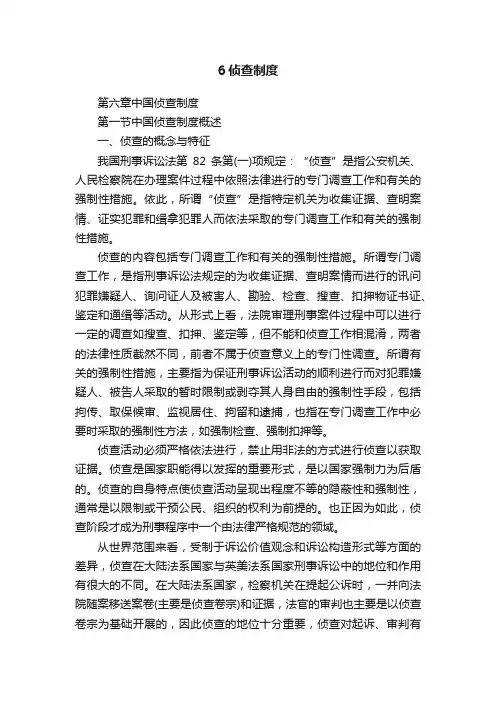
6侦查制度第六章中国侦查制度第一节中国侦查制度概述一、侦查的概念与特征我国刑事诉讼法第82条第(一)项规定:“侦查”是指公安机关、人民检察院在办理案件过程中依照法律进行的专门调查工作和有关的强制性措施。
依此,所谓“侦查”是指特定机关为收集证据、查明案情、证实犯罪和缉拿犯罪人而依法采取的专门调查工作和有关的强制性措施。
侦查的内容包括专门调查工作和有关的强制性措施。
所谓专门调查工作,是指刑事诉讼法规定的为收集证据、查明案情而进行的讯问犯罪嫌疑人、询问证人及被害人、勘验、检查、搜查、扣押物证书证、鉴定和通缉等活动。
从形式上看,法院审理刑事案件过程中可以进行一定的调查如搜查、扣押、鉴定等,但不能和侦查工作相混淆,两者的法律性质截然不同,前者不属于侦查意义上的专门性调查。
所谓有关的强制性措施,主要指为保证刑事诉讼活动的顺利进行而对犯罪嫌疑人、被告人采取的暂时限制或剥夺其人身自由的强制性手段,包括拘传、取保候审、监视居住、拘留和逮捕,也指在专门调查工作中必要时采取的强制性方法,如强制检查、强制扣押等。
侦查活动必须严格依法进行,禁止用非法的方式进行侦查以获取证据。
侦查是国家职能得以发挥的重要形式,是以国家强制力为后盾的。
侦查的自身特点使侦查活动呈现出程度不等的隐蔽性和强制性,通常是以限制或干预公民、组织的权利为前提的。
也正因为如此,侦查阶段才成为刑事程序中一个由法律严格规范的领域。
从世界范围来看,受制于诉讼价值观念和诉讼构造形式等方面的差异,侦查在大陆法系国家与英美法系国家刑事诉讼中的地位和作用有很大的不同。
在大陆法系国家,检察机关在提起公诉时,一并向法院随案移送案卷(主要是侦查卷宗)和证据,法官的审判也主要是以侦查卷宗为基础开展的,因此侦查的地位十分重要,侦查对起诉、审判有着重大的、实质性的影响。
而在英美法系国家,过去通常不把侦查视为严格意义上的刑事诉讼活动,只有起诉以后的活动才算是刑事诉讼活动。
现在尽管已经把侦查纳入广义的刑事诉讼范围,但侦查活动只是提起公诉所做的前期准备工作。
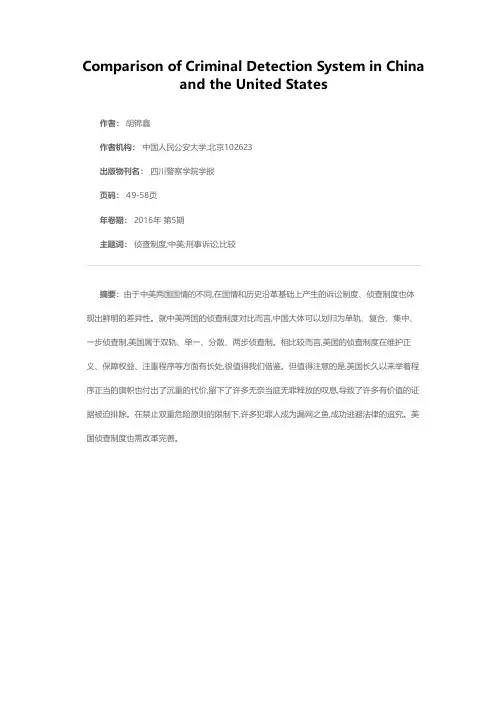
Comparison of Criminal Detection System in China
and the United States
作者: 胡锦鑫
作者机构: 中国人民公安大学,北京102623
出版物刊名: 四川警察学院学报
页码: 49-58页
年卷期: 2016年 第5期
主题词: 侦查制度;中美;刑事诉讼;比较
摘要:由于中美两国国情的不同,在国情和历史沿革基础上产生的诉讼制度、侦查制度也体现出鲜明的差异性。
就中美两国的侦查制度对比而言,中国大体可以划归为单轨、复合、集中、一步侦查制,美国属于双轨、单一、分散、两步侦查制。
相比较而言,美国的侦查制度在维护正义、保障权益、注重程序等方面有长处,很值得我们借鉴。
但值得注意的是,美国长久以来举着程序正当的旗帜也付出了沉重的代价,留下了许多无奈当庭无罪释放的叹息,导致了许多有价值的证据被迫排除。
在禁止双重危险原则的限制下,许多犯罪人成为漏网之鱼,成功逃避法律的追究。
美国侦查制度也需改革完善。
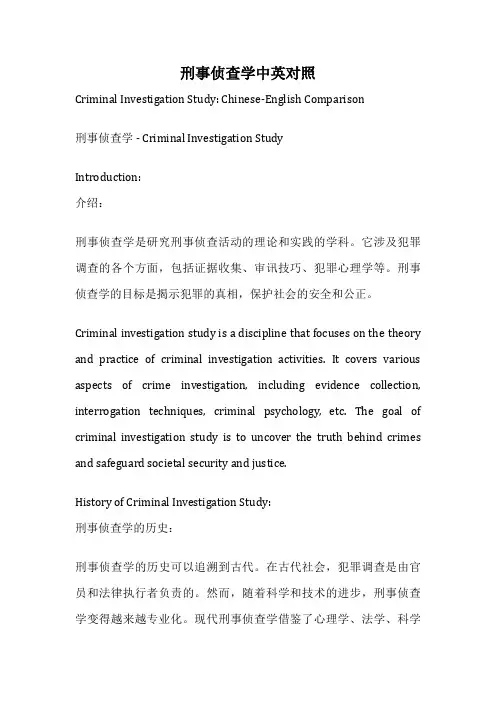
刑事侦查学中英对照Criminal Investigation Study: Chinese-English Comparison刑事侦查学 - Criminal Investigation StudyIntroduction:介绍:刑事侦查学是研究刑事侦查活动的理论和实践的学科。
它涉及犯罪调查的各个方面,包括证据收集、审讯技巧、犯罪心理学等。
刑事侦查学的目标是揭示犯罪的真相,保护社会的安全和公正。
Criminal investigation study is a discipline that focuses on the theory and practice of criminal investigation activities. It covers various aspects of crime investigation, including evidence collection, interrogation techniques, criminal psychology, etc. The goal of criminal investigation study is to uncover the truth behind crimes and safeguard societal security and justice.History of Criminal Investigation Study:刑事侦查学的历史:刑事侦查学的历史可以追溯到古代。
在古代社会,犯罪调查是由官员和法律执行者负责的。
然而,随着科学和技术的进步,刑事侦查学变得越来越专业化。
现代刑事侦查学借鉴了心理学、法学、科学和技术等多个学科的知识,使犯罪调查变得更加科学和高效。
The history of criminal investigation study can be traced back to ancient times. In ancient societies, crime investigation was carried out by officials and law enforcers. However, with the advancement of science and technology, criminal investigation study became more specialized. Modern criminal investigation study incorporates knowledge from various disciplines such as psychology, law, science, and technology, making crime investigation more scientific and efficient.Key Concepts in Criminal Investigation Study:刑事侦查学的关键概念:1. Evidence: Evidence is crucial in criminal investigation as it provides proof or support for the existence or non-existence of a fact. It can be physical, testimonial, or documentary.2. Crime Scene: The crime scene refers to the location where a crime has been committed. It is important for investigators to properly secure and process the crime scene to preserve evidence.3. Interrogation: Interrogation is the process of questioning suspects, witnesses, or persons of interest in order to obtain information relevant to the investigation. Effective interrogation techniques areessential in obtaining reliable information.4. Profiling: Profiling is the process of analyzing crime scene evidence and behavior patterns to create a psychological and behavioral profile of the perpetrator. It helps investigators narrow down the list of suspects.5. Forensic Science: Forensic science involves the application of scientific techniques to analyze physical evidence. It includes disciplines such as DNA analysis, fingerprint identification, ballistics, etc.Conclusion:结论:刑事侦查学在犯罪调查中发挥着重要的作用。
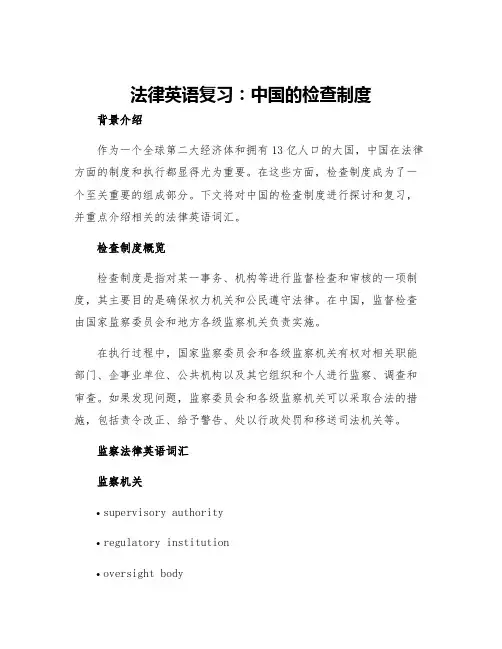
法律英语复习:中国的检查制度背景介绍作为一个全球第二大经济体和拥有13亿人口的大国,中国在法律方面的制度和执行都显得尤为重要。
在这些方面,检查制度成为了一个至关重要的组成部分。
下文将对中国的检查制度进行探讨和复习,并重点介绍相关的法律英语词汇。
检查制度概览检查制度是指对某一事务、机构等进行监督检查和审核的一项制度,其主要目的是确保权力机关和公民遵守法律。
在中国,监督检查由国家监察委员会和地方各级监察机关负责实施。
在执行过程中,国家监察委员会和各级监察机关有权对相关职能部门、企事业单位、公共机构以及其它组织和个人进行监察、调查和审查。
如果发现问题,监察委员会和各级监察机关可以采取合法的措施,包括责令改正、给予警告、处以行政处罚和移送司法机关等。
监察法律英语词汇监察机关•supervisory authority•regulatory institution•oversight body监察职责•oversight function •supervisory responsibility •regulatory duty监察对象•subject under surveillance •entity under inspection •object of oversight监察措施•corrective action•warning•administrative sanction •referral to judicial authorities 国家监察委员会•National Supervisory Commission •NSC视察•inspection•review•examination监察制度的重要性监察制度是中国法律体系的重要组成部分,其重要性不言而喻。
作为一项权力运行的重要机制,监察制度旨在确保政府公正、廉洁和透明,满足人民对政府合法权力的保障要求,维护社会稳定和公共利益。
同时,监察制度也是促进政府改革和内部治理的有效途径。
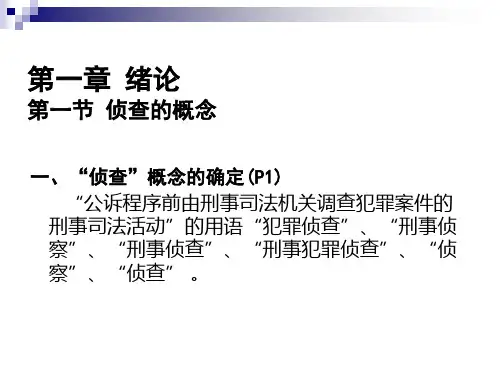
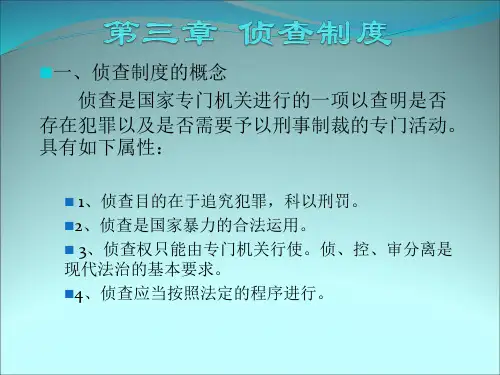
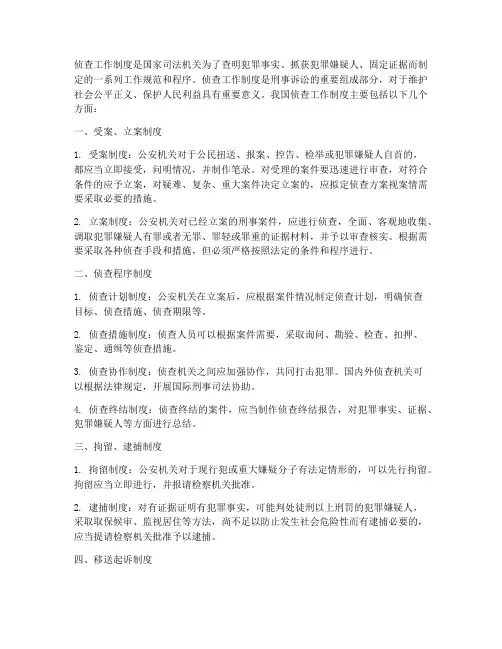
侦查工作制度是国家司法机关为了查明犯罪事实、抓获犯罪嫌疑人、固定证据而制定的一系列工作规范和程序。
侦查工作制度是刑事诉讼的重要组成部分,对于维护社会公平正义、保护人民利益具有重要意义。
我国侦查工作制度主要包括以下几个方面:一、受案、立案制度1. 受案制度:公安机关对于公民扭送、报案、控告、检举或犯罪嫌疑人自首的,都应当立即接受,问明情况,并制作笔录。
对受理的案件要迅速进行审查,对符合条件的应予立案,对疑难、复杂、重大案件决定立案的,应拟定侦查方案视案情需要采取必要的措施。
2. 立案制度:公安机关对已经立案的刑事案件,应进行侦查,全面、客观地收集、调取犯罪嫌疑人有罪或者无罪、罪轻或罪重的证据材料,并予以审查核实。
根据需要采取各种侦查手段和措施,但必须严格按照法定的条件和程序进行。
二、侦查程序制度1. 侦查计划制度:公安机关在立案后,应根据案件情况制定侦查计划,明确侦查目标、侦查措施、侦查期限等。
2. 侦查措施制度:侦查人员可以根据案件需要,采取询问、勘验、检查、扣押、鉴定、通缉等侦查措施。
3. 侦查协作制度:侦查机关之间应加强协作,共同打击犯罪。
国内外侦查机关可以根据法律规定,开展国际刑事司法协助。
4. 侦查终结制度:侦查终结的案件,应当制作侦查终结报告,对犯罪事实、证据、犯罪嫌疑人等方面进行总结。
三、拘留、逮捕制度1. 拘留制度:公安机关对于现行犯或重大嫌疑分子有法定情形的,可以先行拘留。
拘留应当立即进行,并报请检察机关批准。
2. 逮捕制度:对有证据证明有犯罪事实,可能判处徒刑以上刑罚的犯罪嫌疑人,采取取保候审、监视居住等方法,尚不足以防止发生社会危险性而有逮捕必要的,应当提请检察机关批准予以逮捕。
四、移送起诉制度公安机关侦查终结的案件,对于犯罪事实清楚,证据确实、充分,犯罪性质和罪名认定正确,法律手续完备,依法应当追究刑事责任的,应当移送同级人民检察院审查决定是否起诉。
五、证据制度1. 证据收集制度:侦查人员必须严格依照法定程序,收集能够证实犯罪嫌疑人有罪或者无罪,犯罪情节轻重的各种证据。
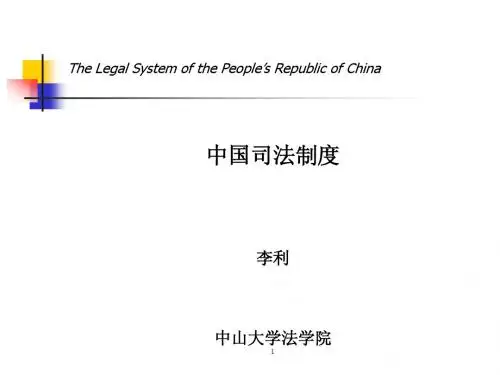
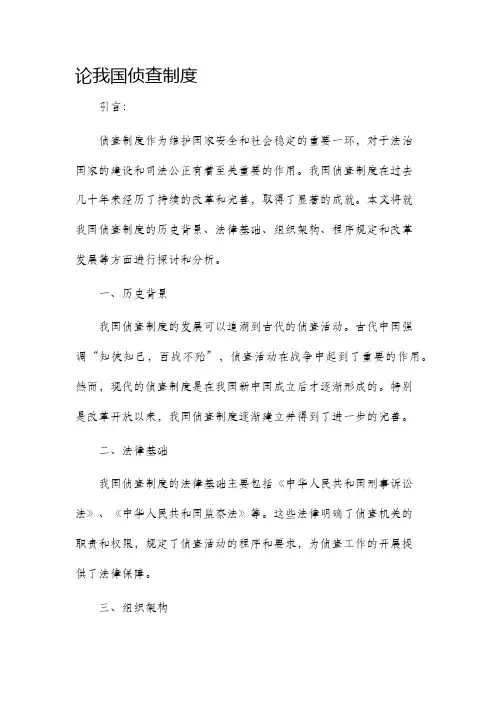
论我国侦查制度引言:侦查制度作为维护国家安全和社会稳定的重要一环,对于法治国家的建设和司法公正有着至关重要的作用。
我国侦查制度在过去几十年来经历了持续的改革和完善,取得了显著的成就。
本文将就我国侦查制度的历史背景、法律基础、组织架构、程序规定和改革发展等方面进行探讨和分析。
一、历史背景我国侦查制度的发展可以追溯到古代的侦查活动。
古代中国强调“知彼知己,百战不殆”,侦查活动在战争中起到了重要的作用。
然而,现代的侦查制度是在我国新中国成立后才逐渐形成的。
特别是改革开放以来,我国侦查制度逐渐建立并得到了进一步的完善。
二、法律基础我国侦查制度的法律基础主要包括《中华人民共和国刑事诉讼法》、《中华人民共和国监察法》等。
这些法律明确了侦查机关的职责和权限,规定了侦查活动的程序和要求,为侦查工作的开展提供了法律保障。
三、组织架构我国侦查制度的组织架构包括公安机关、国家安全机关和监察机关等。
其中,公安机关负责侦查刑事案件,国家安全机关负责侦查涉及国家安全的案件,监察机关负责侦查职务犯罪和行政违法行为等。
这些机关分工协作,形成了相互配合的侦查体系。
四、程序规定我国侦查制度规定了一系列的程序要求,其中包括侦查许可的原则、侦查取证的方式、侦查活动的时限等。
侦查人员在开展侦查活动时必须遵守这些程序规定,确保侦查工作的合法性和公正性。
五、改革发展我国侦查制度的改革发展始终与社会现实和司法改革紧密相连。
近年来,在司法领域深化改革的推动下,我国侦查制度取得了一系列的创新和进步。
例如,依法采取人证物证相结合的侦查取证方式,加强对侦查活动的监督和审查,提高了侦查工作的科学性和效率。
结论:我国侦查制度在历史发展中逐渐完善,并在改革发展过程中取得了显著的成就。
然而,侦查制度仍面临一些挑战和问题,如如何保障侦查活动的合法性和公正性,如何加强对侦查人员的培训和监督等。
通过进一步完善侦查制度,提高侦查工作的科学性和效率,将有助于维护国家安全和社会稳定,推进法治国家的建设和司法公正。
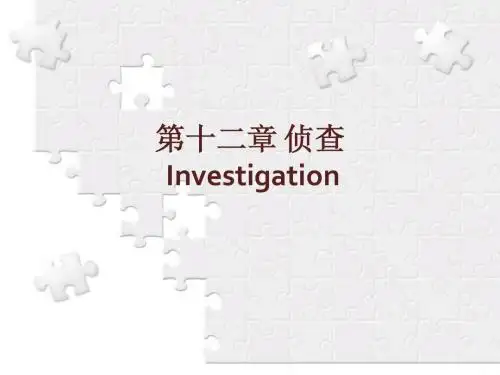
刑事侦查基本工作制度一、引言刑事侦查工作是依法进行犯罪侦查、证据收集、犯罪嫌疑人抓捕等活动的过程,是司法程序的重要组成部分。
为了确保刑事侦查工作的公正、公平、高效,各国都建立了相应的刑事侦查基本工作制度。
本文将介绍我国刑事侦查基本工作制度的主要内容及其特点。
二、我国刑事侦查基本工作制度1. 侦查机构我国刑事侦查基本工作制度主要由公安机关、国家安全机关、人民检察院和人民法院等侦查机构共同实施。
其中,公安机关是刑事侦查工作的主力军,负责侦查各类刑事案件;国家安全机关负责侦查危害国家安全的案件;人民检察院负责侦查职务犯罪案件;人民法院负责审理刑事案件。
2. 侦查权限侦查机构在开展刑事侦查工作时,应当依法行使侦查权。
侦查权包括侦查措施的采取、侦查取证、强制措施的适用等。
侦查机构在侦查过程中,有权依法询问犯罪嫌疑人、证人、鉴定人等,查阅、提取、扣押涉案物品和资料,采取技术侦查措施等。
3. 侦查程序刑事侦查程序是保障侦查工作公正、公平、高效的重要环节。
侦查程序主要包括:(1)报案、控告、举报的受理;(2)立案侦查;(3)侦查措施的采取;(4)侦查终结;(5)案件移送。
4. 侦查取证侦查取证是刑事侦查工作的核心任务。
侦查机构在侦查过程中,应当全面、客观、公正地收集、固定、提取、鉴定与案件有关的证据。
侦查取证工作应当遵循合法、合规、科学、公正的原则,确保证据的真实性、合法性和可信度。
5. 强制措施刑事侦查过程中,为保证侦查工作的顺利进行,侦查机构可以依法采取强制措施。
强制措施包括:拘传、取保候审、监视居住、拘留、逮捕等。
采取强制措施应当遵循合法、适当、及时、必要的原则,保障嫌疑人的合法权益。
6. 侦查协作侦查协作是刑事侦查工作中不可或缺的一环。
侦查机构之间应当加强协作,共同打击犯罪。
侦查协作主要包括:信息共享、线索通报、侦查措施的配合、案件移送等。
7. 侦查监督侦查监督是对侦查机构侦查活动的合法性、合规性进行监督的制度。
侦查措施的相关英语作文Title: Relevant English Composition on Investigative Measures。
In contemporary society, investigative measures play a pivotal role in maintaining law and order, ensuring justice, and safeguarding the rights of individuals. Whether conducted by law enforcement agencies, intelligence services, or private investigators, these measures encompass a wide range of techniques and methodologiesaimed at gathering evidence, uncovering truths, and solving crimes. In this essay, we will delve into the various aspects of investigative measures, their significance, and ethical considerations.To begin with, investigative measures encompass a plethora of techniques, including surveillance, interrogation, forensic analysis, undercover operations,and electronic monitoring, among others. Each method serves a distinct purpose and is employed based on the nature ofthe case, available resources, and legal constraints. Surveillance, for instance, involves the covert observation of individuals or groups suspected of engaging in criminal activities. This may entail physical surveillance by trained operatives or the use of sophisticated technology such as CCTV cameras and drones.Interrogation is another crucial investigative measure employed to extract information from suspects, witnesses, or persons of interest. It requires skilled interrogators who employ various psychological tactics to elicit truthful responses while adhering to legal guidelines regarding coercion and the rights of the interviewee. Forensic analysis, on the other hand, involves the scientific examination of physical evidence such as DNA, fingerprints, and ballistic data to establish links between suspects and crime scenes.Undercover operations represent a clandestine approach to gathering intelligence and evidence by embedding operatives within criminal organizations or target groups. This method often requires meticulous planning, riskassessment, and adherence to strict protocols to ensure the safety of undercover agents and the integrity of gathered evidence. Electronic monitoring, including the interception of communications and the use of tracking devices, has become increasingly prevalent in the digital age, presenting new challenges and ethical dilemmas regarding privacy rights and legal oversight.The significance of investigative measures cannot be overstated, as they serve as the cornerstone of criminal justice systems worldwide. By gathering evidence and uncovering facts, investigators play a vital role in ensuring that perpetrators are held accountable for their actions and that innocent individuals are exonerated. Moreover, investigative measures contribute to the prevention of future crimes by deterring potential offenders and dismantling criminal networks through targeted enforcement actions.However, the use of investigative measures is not without its ethical considerations and potential pitfalls. One of the primary concerns relates to the balance betweenindividual rights and the need for effective law enforcement. While investigative measures are essential for combating crime, they must be conducted within the boundaries of legal frameworks and respect fundamental human rights such as privacy, due process, and the presumption of innocence.Moreover, the potential for abuse and misuse of investigative measures underscores the importance of robust oversight mechanisms and accountability measures. This includes judicial review of surveillance warrants, independent oversight bodies tasked with monitoring investigative activities, and transparency regarding the use of emerging technologies with implications for privacy and civil liberties.In conclusion, investigative measures represent a critical component of modern law enforcement and intelligence-gathering efforts. From surveillance and interrogation to forensic analysis and undercover operations, these techniques play a vital role in uncovering truths, solving crimes, and ensuring justice.However, their use must be guided by ethical principles, legal frameworks, and respect for individual rights to maintain public trust and uphold the rule of law in society.。
中国的侦查制度(英)System Governing InvestigationsThis system governs investigations and other mandatory measures taken in accordance with law by public security authorities and procuratorates in handling cases. It consists of provisions regarding the nature and mission, organizational structure, principles of activities and working procedures of investigation authorities.Status and Nature of Public Security AuthoritiesPublic security authorities are an important part of the government. They are both an administrative arm and a judicial organ since they are in charge of criminal investigations, playing a unique role in cracking down on crimes and maintaining social security.Criminal PoliceCriminal police are a major force of the police.1. Qualification Requirements for Investigative OfficersArticle 26 of the People's Police Law providesthat investigative officers should meet the following conditions:Citizens at least 18 years of age;Support the Constitution of the People's Republicof China;In good political, professional and moral standing;In good health;Have at least a senior high school education;Willing to be a policeman.Persons who have the following records should not be a member of the police:Having received criminal penalty for committing a crime;Having been dismissed from public office.2. PromotionsPolice are divided into 13 ranks in five categories:Police Commissioner and Deputy Commissioner;Police Superintendent Level 1, 2 and 3;Police Inspector Level 1, 2 and 3;Police Sergeant Level 1, 2 and 3;Police Constable Level 1 and 2.The Ministry of Public Security supervises the ranking and promotions of the police.Investigations1. Acceptance and Establishment of CasesPublic security authorities should immediately accept, inquire about, take notes of and hear cases of suspects turned in, reported or brought to the police by citizens or suspects who turn themselves in. Those that meet conditions should be accepted and filed as a case and for complicated and material cases, an investigation plan and, if necessary, necessary measures have to be taken.2. Procedures for Criminal InvestigationsFor criminal cases that already been filed withthe police, investigations should be launched for a thorough and impartial collection of evidence that may determine whether the suspect is guilty or innocentand, if guilty, whether it is a felon or a misdemeanor. Depending on actual needs, various detective means and measures will be taken in strict compliance with statutory procedures.3. Procedures for Detentions and ArrestsPublic security authorities may proceed to detain criminals caught in the act or material suspects in accordance with statutory procedures; they may also seek approval from procuratorates for an arrestwarrant for suspects for whom sufficient evidence of incrimination exists and a sentence is likely, and for whom measures such as obtaining a guarantor in anticipation of trial out of custody and surveillance of residence is insufficient for ensuring social security and order.4.Procedures for Case Transfer and ProsecutionCases concluded by public security authorities for which the facts are clearly established, evidence is verified and sufficient, the nature of crime and name of felony correctly defined, legal procedures completed and for which criminal liabilities should beprosecuted, should be transferred to the procuratorate at the same level to determine whether public prosecution is warranted.5. Procedures for Evidence GatheringDetectives should strictly follow statutory procedures in collecting all kinds of evidence that can prove whether a suspect is guilty or not, or how serious the felony is. Extortion of confession through torture and collecting evidence through threat, inducement, deception or other illegal means are strictly forbidden.。
法律词汇:侦查和执行篇铁路法院 railway court提起公诉 institute a public prosecution铁路检察院 railroad transport procuratorate庭审程序 procedure of court trial通缉 wanted for arrest投案 appearance退回补充侦查 return of a case for supplementary investigation 委托辩护 entrusted defense未成年人法庭 juvenile court无行政职务的法官 associate judge无正当理由拒不到庭 refuse to appear in court without due cause 无罪判决 acquittal, finding of not guilty物证 material evidence先予执行申请书 application for advanced execution先予执行 advanced execution刑事案件 criminal case刑事拘留 criminal detention刑事强制拘留 criminal coercive/compulsory measures刑事审判庭 criminal tribunal刑事诉讼 criminal proceedings刑事诉讼法 Criminal Procedural Law刑事自诉状 self-incriminating criminal complaint行政案件 administrative case行政审判庭 administrative tribunal行政诉讼 administrative proceedings行政诉讼法 Administrative Procedural Law宣告失踪、宣告死亡案件 cases concerning the declaration of disappearance and death宣判笔录 record of rendition of judgement选民资格案件 cases concerning qualifications of voters 询问证人 inquire/question a witness训诫 reprimand讯问笔录 record of interrogation询问犯罪嫌疑人 interrogate criminal suspect。
法律英语在检察工作中的运用
在检察工作中,法律英语被广泛运用。
这是几种常见的应用方式:
1. 法律文件的翻译和审查。
在检察机关处理案件过程中,需要涉及到外籍人士、外国公司或国外的法律文件。
翻译和审查这些文件需要熟练的法律英语能力。
2. 参与国际司法合作。
随着全球化的发展,跨境犯罪越来越普遍。
以及在侦查和打击犯罪行为方面,国际司法合作变得越来越重要。
同时,涉及到跨境转移财产和司法协助等方面,都需要运用到法律英语知识。
3. 就涉外案件进行辩护。
在国际交往中,一方的涉外案件也不可避免。
检察官需要听取相关人员的陈述、掌握相关证据和文件,并在庭审中就案件进行辩护。
这也需要检察官具备扎实的法律英语能力。
在越来越全球化的背景下,法律英语已经渗透入各个领域,为检察工作提供了重要的帮助。
法律英语复习:中国的检查制度According to the Law on the Organization ofPeople's Procuratorates, the People's Procuratorates are the State's organs for legal supervision that exercise the power of prosecution. They are elected by and report to the People's Congress at the same level.Organization of ProcuratoratesArticle 2 of the Law on the Organization ofPeople's Procuratorates states that procuratorates are set up at the supreme and local levels; in addition, special procuratorates such as military procuratorial organs are set up. Such a top-down structure reflects the pyramid structure of the country's prosecution, in which the superior leads the subordinate. This is noticeably different from the court system in which the higher court supervises the lower court. This centralized system is created to maintain the consistency of the country's legal structure.The Supreme People's Procuratorate leads local and special procuratorates. Local means provincial, autonomous regional and municipal procuratorates and their branches, as well as procuratorates at the autonomous prefecture/cities directly under provincial governments, county, city, autonomous city and urban district levels. Special procuratorates include military and railway transportation prosecution. Procuratorates are established at levels corresponding to those of courts so that cases can be prosecuted in accordance with legal procedures.Responsibilities of ProcuratoratesAccording to the Law on the Organization ofPeople's Procuratorates and other related laws, procuratorates exercise the following powers: Exercise the power of prosecution on cases of treason, separatism and major crimes seriously hindering the uniform implementation of the state's policies, laws, writs, administrative decrees;Investigate criminal cases they directly handle;Review cases investigated by public security and state security authorities to decide if arrests, prosecutions are warranted; supervise the legality of such investigations;Initiate public prosecution and support public prosecution for criminal cases; supervise the legality of trials conducted by courts;Supervise the rulings and judgments on criminal cases and the legality of activities of jails, detention centers and reform-through-labor institutions;Supervise civil and administrative trials of courts.Organizational Structure of ProcuratoratesOrganizationally, procuratorates are composed of procuratorial committees and other specialized departments.1. Procuratorial CommitteeThe chief prosecutor of a procuratorate oversees the day-to-day operation of procuratorates. Clause 2, Article 3 of the Law on the Organization of People'sProcuratorates states that People's Procuratorates at all levels should establish a Procuratorial Committee and a democratic centralization system should be implemented. The committee should, under the leadership of the chief prosecutor, deliberate on major cases and other major issues. Should the chief prosecutor disagree with the decision of the majority of the committee members, he or she may refer the issue to the People's Congress at the same level for adjudication.2. Working BodyInternally, working bodies are created within each procuratorate. These include prosecutors for criminal, economic, disciplinary, jails, and civil and administrative cases. In particular, procuratorates have set up anti-corruption bureaus and reporting centers that fight embezzlement, bribery, dereliction and infringements of rights through collaboration with the masses.System of ProsecutorsThis system aims at managing prosecutors who, in accordance with laws, exercise the state power of prosecution at procuratorates. It consists of rules specifying the responsibilities, rights and obligations, qualifications, appointments and removals, examination, training, awards and penalties, salaryand compensation, resignation, and retirement of prosecutors. The Prosecutors Law was adopted on February 28, xx at the 12th session of the Standing Committee of the Eighth National People's Congress. That law went into force on July 1, xx.1. Qualifications of ProsecutorsProsecutors include chief prosecutor and deputy prosecutor of People's Procuratorates at all levels, members of the Procuratorial Committee, prosecutorsand assistant prosecutors. Prosecutors as a whole must meet the following qualifications:Be a citizen of the People's Republic of China;Be at least 23 years of age;Support the Constitution of the People's Republicof China;Be in political, professional and moral standing;Be in good health;A graduate of law from an institution of higher learning, or a non-law graduate from an institution of higher learning with in-depth knowledge of law, with two years of working experience; or holders of a bachelor's degree in law with a full year of working experience; those holding a Master's or Ph.D. degreein law are not subject to the working-experience limit described above.Those that have been penalized for crimes or have been dismissed from their public offices cannot be elected judges.Prosecutors obtain their qualifications in two ways:Through qualification examinations. Open examinations are administered regularly by the Supreme People's Procuratorate to recruit junior and assistant prosecutors. Chinese citizens with a three-year college education are eligible for the examination. Those who have passed the examination and are deemedas being in good political and ethical standing will be qualified as prosecutors and awarded a Certificate of Qualifications for Prosecutor;Through training and tests.Prosecutors and prosecution personnel can be disqualified for any of the following reasons: Resignation approved;Dismissed by procuratorial bodies;Removal of name from roll;Removal from office as a disciplinary penalty;Removal from position;Criminally penalized;Other reasons incompatible with the position of prosecutor.2. System for Appointment and Removal of ProsecutorsThe chief prosecutor is elected and removed by the People's Congress at the same level, but the appointment and removal of local chief prosecutors have to be reported to the chief prosecutor of higher procuratorates who, in turn, will submit theappointments and removals to the Standing Committee of the People's Congress at the same level for approval.The appointment and removal of the deputy chief prosecutor, members of the Procuratorial Committee and prosecutors must be submitted to the Standing Committee of the People's Congress at the same level, but the appointment and removal of assistant prosecutors can be approved by the chief prosecutor.3. Promotions, Awards and Penalties of ProsecutorsProsecutors are promoted in two ways: regular promotions and selective promotions.Prosecutors are divided into 12 ranks, with the highest being the Chief Prosecutor of the Supreme People's Procuratorate, followed by Grand Prosecutors, Senior Prosecutors and prosecutors (level 2 through 12). The ranking of prosecutors is determined by a range of factors, including their position, performance, professionalism and seniority.Awards are typically a combination of moral and material incentives. These include public recognitionof achievements, Third Prize, Second Prize, First Prize and the conferring of an honorary title.Penalties include warning, a record of demerit in personal files; a record of a major demerit; demotion; removal from position; dismissal from office. A removal from position is accompanied by a lowering of salary and rank; those who have committed a crime will be prosecuted for their criminal liabilities.4. Safeguards for ProsecutorsProsecutors are protected by law in performing their duties. These include:Professional safeguards: Prosecutors are free from interference in exercising their judicial powers from any administrative authorities, social organization or individual; they shall not be removed, demoted, dismissed or disciplined unless for statutory reasons and procedures.Corporal safeguard: Prosecutors receive legal protection for their corporal, property andresidential safety.Salary safeguards: Prosecutors receive remuneration for their performance of duties and enjoy insurance and other benefits.Others: Prosecutors are entitled to powers and working conditions befitting their performance of duties; they have the right to resign, petition or accuse.Working ProceduresThese govern the scope of operations andactivities for prosecutors. They include:1. Procedures for procuratorates supervising criminal investigations undertaken by public security (including state security) authorities.Verify and approve arrest warrants. The Constitution provides that, unless approved or ruled by procuratorates or courts and executed by public security authorities, citizens are not subject to arrest;Verify criminal cases concluded and transferred by public security authorities to determine if public prosecution is warranted.Supervise the legality of investigation activties by public security authorities.2. Procedures for prosecutors to directly accept and investigate cases. According to an order issued by the Supreme People's Procuratorate in early xx, 53 types of cases in four categories are directly handled by procuratorates:Embezzlement and bribery as defined in Chapter 8, Criminal Code, as well as other crimes such as misappropriation of public funds as defined in other chapters that should be penalized as those specifiedin Chapter 8;Dereliction of duties as defined in Chapter 9, Criminal Code, including abuse of power, negligence of duties, perversion of law in prosecution and adjudication;Violation of citizens' corporal rights and democratic rights committed by government employees, such as illegal detention, illegal searches and extortion of confessions through torture;Other major crimes committed by government employees that require direct involvement of procuratorates; in such cases, approval by procuratorates above the provincial level is needed.3. Public prosecution: According to the Criminal Law and criminal procedure law, except for a few private prosecution cases, most criminal cases will be publicly prosecuted by People's Procuratorates to People's Courts that have jurisdiction. Cases submitted by public security authorities have to be reviewed by procuratorates without exception and a decision on public prosecution should be made within a month. For cases of a substantive and complicated nature, that deadline can be extended by another half month. Public prosecutions have to be brought to courts with jurisdiction for cases for which facts have been verified and evidence is accurate and sufficient and for which criminal liabilities must be prosecuted.4. Judicial supervision - supervision overjudicial activities undertaken by courts in handlingcivil, criminal and administrative cases. The appearance of prosecutors in trials of criminal cases means not just support of public prosecution but also supervision of the trial proceedings. In addition, prosecutors are empowered to protest rulings or judgments on criminal cases wrongly passed by courts.5. Supervision on enforcement of criminal rulings and on jails. This includes:Execution death penalty: Members of procuratorates must be present at executions to supervise proceedings and verify the identity of the condemned prisoner.Penalties carried out at jails and penitentiaries, including the legality of reduction in sentencing, probation, medical parole, serving sentence outside prison, and suspension of sentence.Legality of activities at detention centers and reform-through-labor institutions.原文转自:http://www./classroom/flyy/。
法律英语学习:中国的侦查制度
This system governs investigations and other mandatory measures taken in accordance with law by public security authorities and procuratorates in handling cases. It consists of provisions regarding the nature and mission, organizational structure, principles of activities and working procedures of investigation authorities.
Status and Nature of Public Security Authorities Public security authorities are an important part of the government. They are both an administrative arm and a judicial organ since they are in charge of criminal investigations, playing a unique role in cracking down on crimes and maintaining social security.
Criminal Police
Criminal police are a major force of the police.
1. Qualification Requirements for Investigative Officers
Article 26 of the People's Police Law provides
that investigative officers should meet the following conditions:
Citizens at least 18 years of age;
Support the Constitution of the People's Republic
of China;
In good political, professional and moral standing;
In good health;
Have at least a senior high school education;
Willing to be a policeman.
Persons who have the following records should not
be a member of the police:
Having received criminal penalty for committing a crime;
Having been dismissed from public office.
2. Promotions
Police are divided into 13 ranks in five categories:
Police Commissioner and Deputy Commissioner;
Police Superintendent Level 1, 2 and 3;
Police Inspector Level 1, 2 and 3;
Police Sergeant Level 1, 2 and 3;
Police Constable Level 1 and 2.
The Ministry of Public Security supervises the ranking and promotions of the police.
Investigations
1. Acceptance and Establishment of Cases
Public security authorities should immediately accept, inquire about, take notes of and hear cases of suspects turned in, reported or brought to the police by citizens or suspects who turn themselves in. Those that meet conditions should be accepted and filed as a case and for complicated and material cases, an investigation plan and, if necessary, necessary measures have to be taken.
2. Procedures for Criminal Investigations
For criminal cases that already been filed with
the police, investigations should be launched for a thorough and impartial collection of evidence that may determine whether the suspect is guilty or innocent and, if guilty, whether it is a felon or a misdemeanor. Depending on actual needs, various detective means and
measures will be taken in strict compliance with statutory procedures.
3. Procedures for Detentions and Arrests
Public security authorities may proceed to detain criminals caught in the act or material suspects in accordance with statutory procedures; they may also seek approval from procuratorates for an arrest warrant for suspects for whom sufficient evidence of incrimination exists and a sentence is likely, and for whom measures such as obtaining a guarantor in anticipation of trial out of custody and surveillance of residence is insufficient for ensuring social security and order.
4.Procedures for Case Transfer and Prosecution
Cases concluded by public security authorities for which the facts are clearly established, evidence is verified and sufficient, the nature of crime and name of felony correctly defined, legal procedures completed and for which criminal liabilities should be prosecuted, should be transferred to the procuratorate
at the same level to determine whether public prosecution is warranted.
5. Procedures for Evidence Gathering
Detectives should strictly follow statutory procedures in collecting all kinds of evidence that can prove whether a suspect is guilty or not, or how serious the felony is. Extortion of confession through torture and collecting evidence through threat, inducement, deception or other illegal means are strictly forbidden.。